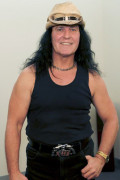Greg Lake, bassist and guitarist for Emerson, Lake and Palmer and a founding member of King Crimson, died on Wednesday after a lengthy battle with cancer. He was 69.
Lake is the second member of ELP to pass away this year after Keith Emerson took his own life in March.
A statement was posted on Lake’s official website and social media by his manager, Stewart Young:
Yesterday, December 7th, I lost my best friend to a long and stubborn battle with cancer. Greg Lake will stay in my heart forever, as he has always been. His family would be grateful for privacy during this time of their grief. Many thanks, Stewart Young
Lake first took up guitar at the age of 12 and became friends with a young Robert Fripp through their guitar teacher in Dorset, England. In the late 60’s, Fripp was already a member of the band Giles, Giles and Fripp and needed a new bassist, so he asked Greg to change instruments and brought him into the original version of what would become King Crimson.
1969 became a whirlwind for the new band as they went from first rehearsals to playing in front of 500,000 people opening for the Rolling Stones in Hyde Park to their debut album, In the Court of the Crimson King.
Even though to album was a critical success, there was descension within the band over their style with Mike Giles quitting and Lake soon following suit even though he did record the vocals for their second album, In the Wake of Poseidon.
Fortunately, Lake had met Keith Emerson in late 1969 when his band The Nice co-headlined with King Crimson and the two struck up a professional friendship. Looking to break free from their own bands, Lake and Emerson received help from Robert Stigwood who introduced them to drummer Carl Palmer of The Crazy World of Arthur Brown and Atomic Rooster.
By August of 1970, the new trip was playing live and soon had a contract with Atlantic Records. Later in the year, they went into the studio to record their debut album with Lake producing. Released in November, the self-titled album went to number 4 in the U.K. and 18 in the U.S. and produced the now standard Lucky Man which Lake wrote at the age of 12.
With a sound that borrowed liberally from classical music, their second album, Tarkus, included the title piece which spanned the first side in movements and followed with an album of their live performance of Mussorgsky’s Pictures at An Exhibition.
The band’s first five studio albums went to the top ten in Britain and all hit the top twenty in the U.S. on the strength of ELP’s regular touring which included great showmanship and special effects; however, there were always clashes between members over their music. After a two year hiatus from 1974 to 1976, they released Works, Volume 1, a double album that showed the continued separation of the members with each taking a side for their solo compositions along with one side as a group.
They followed with Works, Volume 2 and the “contractual obligation” album, Love Beach, before breaking up in 1979.
Greg released two solo albums with Gary Moore, Greg Lake (1981) and Manoeuvres (1983) before a two year stint as a member of Asia. In 1985, he formed Emerson, Lake and Powell with Keith Emerson and former Rainbow drummer Cozy Powell but, after only one album, the band split and, in 1991, ELP reformed for the albums Black Moon and In the Hot Seat. The reformed band toured at times, even though both Palmer and Emerson had some health problems, but were once again broken up by the end of the decade.
Over the years, Lake collaborated with a long list of artists, playing in Ringo Starr’s All Starr Band along with the likes of Robert Plant, the Who, Gary Booker, Jethro Tull and the Trans-Siberian Orchestra. He also toured regularly with The Greg Lake Band.
For the last decade, Lake occasionally played and toured with Keith Emerson and, in 2010, all three members of ELP played what would be their final performance at the High Voltage Festival.















